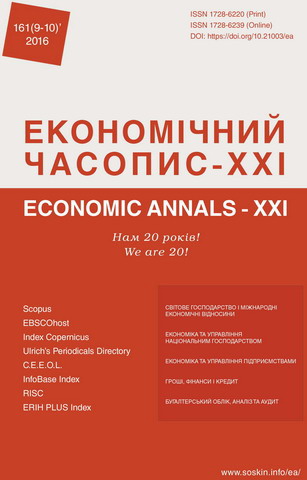Податок на доходи фізичних осіб у формуванні фінансових ресурсів розширеного уряду
Individual income tax in the formation of financial resources of the enlarged government
Author(s): Svitlana Boiko, Oksana DrahanSubject(s): Economy, Governance, Economic policy, Government/Political systems, Political economy, Politics and society, Public Finances, Fiscal Politics / Budgeting
Published by: Institute of Society Transformation
Keywords: Individual Income Tax; Revenues of Consolidated Budget of Ukraine; Income of Population; Economic and Mathematical Modelling;
Summary/Abstract: Introduction. At the present stage of social, economic, and geopolitical development of Ukraine, revenues and expenditures disposed by the enlarged government are dominants of the existence of public finance. There is a need for financial support of expenses and search for additional sources of their financing, including funds generated due to the taxation of individual income. The purpose of the article is to research the individual income tax in the context of its fiscal efficiency, formation of financial resources of the enlarged government and its compliance with the income level of the population. Methods. For the purpose identified, the authors have applied the following economic, mathematical, and statistical methods: clustering, multi-factor regressive modelling, the coefficient method; the method of relative statistical figures. Results. The individual income tax should be referred to as a tax (the main direct tax) which forms budgets at different levels. Fiscal significance of this tax is strengthened in the context of macro-fiscal changes. The enhancement of fiscal significance of the individual income tax consists in providing a sixth part of all the revenues of the state budget and a large amount of revenues of local budgets. A multi-factor regressive model of incomes provided by the individual tax income is built as a function of five variables: salary, profit and mixed income, income from property, a basic tax rate for the incomes of natural persons, individual income tax rate for passive revenues. Conclusions. The authors have proved inconsistency of fiscal efficiency and social justice of the individual income tax and strengthening of taxation in the period of social and economic instability, which leads to an increase in the unemployment rate and a decrease in the real income of the population. The authors have determined the role of the individual income tax in the formation of budgets and noted that the reinforcement of tax burden occurs coincidently with a decrease in the real income of the population.
Journal: Економічний часопис - ХХІ
- Issue Year: 161/2016
- Issue No: 9-10
- Page Range: 35-38
- Page Count: 4
- Language: Ukrainian

